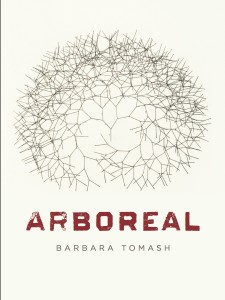
Reviewed December 1, 2014 by Alexandra Mattraw.
Barbara Tomash writes that “it is questionable / whether a sentence can breathe or not” (“Against the Glass”). Yet in the poems of Arboreal, she ultimately presses against various windows, interrogating the limits but branching possibilities of language—that medium between the personal imagination and often impersonal world. Here, in Tomash’s third book, lyric “must be listened to” by the reader, for an engaging immediacy exists for the “startled” speaker as her body intersects with nature. Despite or perhaps because of her outsider status, the speaker presents us with a familiar post-paradise realm where being means we are all “non-native in the world” (“Light Source”). Setting a female voice in both forest and domestic spaces, Tomash blurs inside and outside landscapes where her speaker seeks to compensate for the disparity between internal experience and exterior reality, “trying to get her mind around deficit” (“After Woods”). The poems hinge upon a sense that beauty is not found in what we can see, but in the invisible we might envision beyond “the edge of perception” (“And the Bright Screen”). Tomash suggests it is in that unknown, where the sensory world is made whole by our transformative interior responses, and vice versa, that authentic experience resides: “isn’t living the tension between container and force?” (“Canopy”).
The title of the collection builds an extended metaphor over the course of the poems, crystalizing an interesting tension between the “mind’s / coiled limbs” (“Planned—Planted—Established—Neglected”), the external limbs of “trees we wanted to climb” (“Against the Glass”), and the city’s “tangle of reeking streets” (“Relict”). Tomash often drops us in liminal woodlands then—a kaleidoscope of shadow and light where questions abound but answers are forever changing. One imagines the mind as a tree of branching ideas that rush across “coiled” dendrites, looking for a language to untangle them, but “untangle a word and it re-knots itself” (“Sentences Split Open Like Seeds”). The speaker searches herself and the outside world for a method to make sense of emotions occurring within: “she is searching for the source of the / whooshing in her ears among fermented papers” (“Planned—Planted—Established—Neglected”).
Tomash’s eleven-page opening poem, “Against the Glass,” alludes to a post-Edenic environment where “what’s edible or poison” is indistinguishable. Perhaps referencing the tree of knowledge as “a single tree against a forest,” the speaker wishes to embrace the forbidden and straddle the fine line existing between what nurtures and destroys, describing trees she wants “to taste, see how they tear themselves up at the roots / near, very near ripening, these sleek purple fruits” (15). This image-rich poem recalls H.D.’s visual, auditory, and tactile precision as well as Niedecker’s gift for condensation; both poets are mentioned as inspirations in Tomash’s liner notes. The “purple fruits” hint at Persephone’s entrapment in Hades and further Tomash’s fascination with metaphoric prisons and duality. We wonder, “is paradox, not paradise her reward?” (“Forest of Names”). In such environments, it seems there is no choice but to accept violence that coexists with beauty. These trees are both “whipping the air” and gently “dusting it.” Nonetheless, the poems appreciate the mercurial in a life that offers, simultaneously, “a certain kind of happiness, or a different kind of pain.”
“Forest of Names” is another poem that stretches across several pages of the book and features many stunning images, allowing the reader to enter an evocative space of “trees in the distance like black wishbones.” The speaker wades through “panicked bodies, beautifully crowned with futility,” while we, too, can empathize with the anxiety that accompanies such navigation. This “locale [that] often seems to swallow her / like bits of glass in a kaleidoscope” alienates speaker and reader alike but reveals modernity’s universal affect of fragmentation. Surprisingly, the same poem alerts us to “the father [that] leaves his handgun unattended,” and as in some other poems, images of war. Real-life problems rear their raw heads in some of these pieces, making the book all the more relevant and interested in authentic experience. Such references include handgun laws, school shootings, radioactive waste, the Haitian crisis, and deforestation. This particular poem is also a good example of Tomash’s penchant for featuring only 5-10 lines per page. Tempering the intensity of the poems, the dominant form lets lines open and breathe while giving the reader space to digest their subject matter.
Some readers might bristle at the many questions that are raised throughout. Although there is much to love in “Forest of Names” for instance, the speaker asks five different questions in that poem alone. Some could be written with dashes or end with line breaks. Or maybe they could be written as suggestive statements instead of being conceptually punctured by question marks, which begin to make the questions feel too rhetorical. Though certainly, the interrogations provide tonal and thematic unification for the book as a whole. Infrequently, I also found myself wishing the poems took more risks, perhaps through more surprising motifs, language play, or rhythmic experimentation, as seen towards the end of the book in the wonderfully refreshing piece, “Whorl.”
It is Tomash’s expansive, lyrical otherwhere that will locate and inspire readers, even though, as seen in “The Shape of the Mind,” “mostly we are placeless.” Yet it is the poet’s embrace of being, “Not inside or Outside,” that enables her to attentively “pinpoint the humming kettle which then becomes light” through imagination. There is much to relish in Arboreal’s almost mystical inhabitation of immediacy, that release of tension between what the speaker perceives and what reality delivers: “thought cresting in language / scratch in wet sand; sand water wells where a crab like a baby’s hand gleams….”